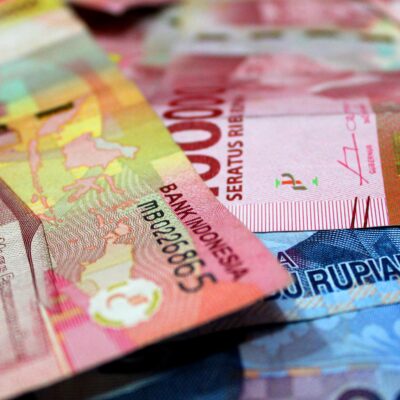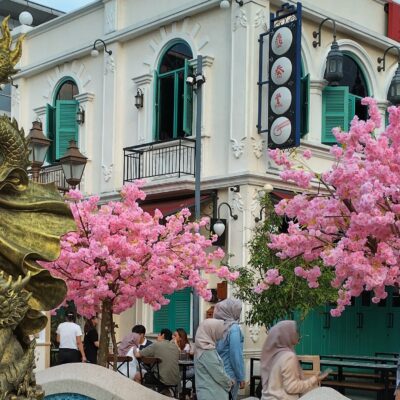It is a myth that civil society is a backbone of democracy. Many cases show that the existence of civil society organisations in the context of authoritarian politics do not necessarily introduce a regime change and in a democratic context they face many limitations in advancing a liberal political order. Indeed, the global trend of authoritarianism affirms the failure of civil society in defending democratic institutions from being hijacked by reactionary populist politics.
The destruction of an Indonesian anti-corruption body that happened under the administration of President Joko Widodo, which is supported by many former civil society activists, illustrates such a tendency.
The myth of civil society and its critiques
Scholars and developmental practitioners who are inspired by influential philosopher Alexis de Tocqueville are responsible for creating the myth of civil society as an important agent of change; in overthrowing authoritarian regimes, introducing democratic politics, and consolidating democracy. Almost 200 years ago, Tocqueville defined civil society as a coherent and unified entity autonomous of the state comprising voluntary social associations, predominantly of the educated middle classes, that mediate between individuals and the state. Scholars of modernisation theory further develop this idea by emphasising elements of educated middle classes within civil society that hold liberal democratic aspirations as the backbone of democracy.
Since the late 1980s, this idea has been celebrated and promoted by academic communities and international donor agencies. Previously, democracy assistance focused on sponsoring the establishment of electoral institutions and supporting economic growth in the hope that it would produce democratic change. Donor agencies tended to avoid supporting bottom-up development for the fear that it would create a fertile ground for leftist movements. However, the formation of civil society organisations in Eastern and Central Europe in the 1980s that opposed communist governments has changed the direction of democracy assistance. Since then, the idea of bolstering civil society as a base for establishing and upholding democracy has been influential in both the aid and diplomatic communities, contributing in what some researchers have labelled as the NGO-isation of social movements.
However, the assertion that Tocquevillian civil society was crucial in promoting regime transition and democratisation has been debunked by a number of researchers, who have found that the collapse of communist authority around the world played a bigger role in regime change in Eastern and Central Europe in the late 1980s and early 1990s than the formation of civil society organisations. More crucially, this regime shift results in a more illiberal form of democracy rather than creating a liberal democratic society. In East Asia, in nations such as South Korea, Japan and Taiwan, the state rather than civil society is also the primary driver of democratisation. Further, in many societies, such as in Indonesia, uncivil groups such as gangsters, militias and the like as well as those that promote religious intolerance are prominent and actively undermine democratic institutions. They have varied and contradictory agendas and interests and some even act as agents of the state in promoting the interests of ruling elites.
The establishment of liberal democracies, such as those in Britain, were a result of so-called ‘bourgeois revolutions’ against aristocrats who stood in the way of capitalist development. With their growing economic power, capitalists created parliamentary institutions and pushed the state to recognise their civil and political rights.
However, democratic forms of government resulting from bourgeois revolutions favoured mainly the interests of the capitalist class and opposed broader socio-political rights, especially of the lower classes. The development of a democracy that is accompanied by the establishment of a welfare system in many nations came as a result of historical class struggles against capitalist domination, not a result of the pressure from educated middle classes within civil society in the sense understood by Tocquevillian idea. There is little evidence that Tocquevillian model of civil society activism—mainly by middle class reformers—has played an influential role in introducing and maintaining democracy.
The limits of civil society activism
Scholars have, indeed, identified the limits of civil society activism in advancing democracy. However, many of them attribute such limits to various external factors such as democratic decline, shrinking civic space, rising polarisation, demobilisation into political parties and the existence of uncivil elements.
By seeing the problems as external, they not only ignore the problematic nature of civil society but also reproduce the myth of this entity. The situation of civil society in Indonesia can illuminate the limits of civil society activism as having more to do with its own nature rather than with something external, shaped by the Cold War legacy that made possible the extermination of leftist movements.
This legacy has made potential progressive challenges from lower class movements, especially from labour and peasant unions in Indonesia, as in many other postcolonial countries, very weak, if not absent, making Tocquevillian model of civil society activism dominant. At least three key characteristics of Indonesian civil society activism render it too weak to present a meaningful opposition to anti-democratic forces. These can be seen from their approach, strategy and organisation.
The approach employed by Indonesia’s civil society movements, particularly dominated by middle class reformers organised within various non-government organisations (NGOs), tends to view the weakness of technocratic institutional designs and capacities and other non-political aspects as the direct cause of complex political problems. This view has made civil society activists rely on institutional and policy designing as well as reformist actors to generate reform under which entrenched vested interests remain unchallenged and could even appropriate those institutions and actors.
With such an approach, the main strategies being used tend to be elitist, mostly undertaken through various forms of policy intervention or political lobbying, or by sporadically infiltrating the power centres. Middle class reformers also have little interest in radically transforming established socio-political order and are inclined to avoid radical methods such as strikes, occupations or acts of sabotage. They contend that this strategy only leads to violent conflict, turmoil, instability and disorder; and this endangers their own privileges and social positions.
They are more interested in advancing and advocating neoliberal discourses on good governance, civil and political rights, and government accountability, which explains why many pro-democracy activists heavily rely on reform institutions such as the KPK (Komisi Pemberantasan Korupsi, the Corruption Eradication Commission) to combat corruption and promote good governance. This is despite the fact that predatory practices have become deeply ingrained in the way power and wealth are accumulated. This means that corruption is not simply a problem related to poor institutional designing, but more structural as a result of particular organisation of power that requires the use of extra-economic means in the accumulation of wealth. In this context, corruption is a means, not an obstruction for accumulation. Hence, simply installing new institutions like the KPK is not an answer.
However, in addressing structural problems like corruption, middle class reformers often ignore this logic of power that defines the works of democratic institutions, including the KPK.
Their reform agendas also tend to address certain issues as they arise, which also leads to a short-term focus. As no long-term agendas being formulated, they also have no clear leadership, structure and organisation. These features contribute to make the changes by civil society activists insignificant in transforming the way power is organised, leading to further consolidate entrenched predatory interests in appropriating democratic institutions.
The weakening of the KPK
The second amendment of Law No. 30 of 2002 on the KPK initiated by President Joko Widodo’s administration in 2019 has ensured the removal of many significant investigative powers of Indonesia’s anti-corruption body. This is an example of the failures of civil society in Indonesia because it has received support from numerous former civil society activists who are now supporters of the government. Further, these changes were made possible by the failure of civil society activists to significantly influence legislative processes. Meanwhile, protests against revisions to the KPK on the streets and through social media also tend to be sporadic and disorganised, making them too weak to block attempts to cripple the KPK.
Even before these changes, the KPK suffered from many institutional limitations. Its establishment was a manifestation of technocratic institutional designing in addressing endemic corruption problems with which entrenched predatory interests remain unchallenged. It came about because of the confluence of two agendas: pressure from reformasi movements to end corruption, collusion and nepotism (KKN) and neoliberal demands to dismantle ‘market-distorting policy choices’.
The KPK has indeed become a threat to predatory interests that rely on the corrupt political environment to accumulate power and wealth. However, the KPK, and other neo-liberal institutions have never entirely eliminated vested interests. As a result, these interests continue to thrive and are able to seize neoliberal technocratic agendas and influence a number of democratic institutions, including the KPK. Many corruption cases involving powerful elites, such as Soeharto’s family, remain untouched.
From its inception, the KPK has at times also been appropriated by powerful elites at the national level to restrain ambitious local political figures that aspire to expand their power and wealth. Most of the cases investigated by this agency implicated political figures and government officials at the local level.
When the KPK acted independently from political influence in investigating corruption cases and even targeted more powerful figures, harsh retaliation from elites in politics, business, the police, and the bureaucracy has been accepted by it. In 2009, the KPK arrested a relative of the former President Susilo Bambang Yudhoyono, Aulia Pohan, who was also the Deputy Governor of Indonesia’s Reserve Bank, for misusing the Bank’s money. In response, the president and his allies started to systematically weaken the agency.
This was done by Yudhoyono by fabricating the criminal case of the then KPK chairman Antasari Azhar to dismiss him from the KPK. A study by scholar Simon Butt concluded that there were many irregularities at Azhar’s trial ‘at which prosecutors could provide no credible evidence of his guilt.’ Other commissioners and investigators also became targets of ‘criminalisation’ (an Indonesian term for fabricated criminal offences), from the corrupt police figures when the KPK investigated corruption cases in the police institution. This has resulted in a long running conflicts between the KPK and the police labelled as ‘gecko versus crocodile’ (cicak versus buaya).
However, challenges from inside Yudhoyono’s ruling party alliance prevented plans to further paralyse the KPK from succeeding. This means that the failure to further weaken the KPK can’t be attributed to civil society protests. To negotiate power, members of the ruling party coalition such as Golkar, the Justice and Prosperous Party (PKS), and the United Development Party (PPP) politicised an anti-corruption narrative by supporting civil society’s protests opposing the ‘criminalisation’ of the KPK commissioners. Therefore, any success in halting efforts to weaken the KPK had more to do with the constellation of power i.e. elites’ consolidation than the strength of a civil society.
It is during the administration of President Jokowi—who is widely viewed as a reformist politician and predominantly supported by a number of former pro-democracy activists and scholars—that the interests of predatory elites are being consolidated. Unlike in Yudoyono’s era, there has not been action by political parties supporting social protests against the weakening of the KPK.
Jokowi’s government and its supporters have mobilised a narrative of Islamist threat by claiming that the KPK is being infiltrated by elements of Islamic radicalism. This narrative justifies the appointment of KPK commissioners who have poor track records in anti-corruption and who have links to corrupt police institutions. Transparency International Indonesia ranks Indonesian police as the fifth most corrupt institution in Indonesia. Reminding of the gecko versus crocodile conflicts, this institution also constantly opposes KPK’s anti-corruption efforts.
Further, activists-turned-government-supporters supported the 2019 changes to the law which weakened the KPK (which the government also claimed was necessary to prevent it from being hijacked by Islamist groups).
Since 2019, some civil society organisations have responded to attempts by the Jokowi administration to weaken the KPK further by organising protests across the country under the banner of #ReformCorrupted. However, their strategy has tended to be sporadic, lacking in leadership and structure, and their demands and strategies are frequently at odds with one another. Consequently, the demonstrations organised by civil society movements have failed to effectively counter predatory interests, making the further paralysation of the KPK unavoidable.
Image: Well-known Indonesian rock band SLANK with former KPK chairman Antasari Azhar. SLANK had supported the anti-corruption movement, but was silent when KPK was crippled during Jokowi administration. Credit: Ikhlasul Amal/Flickr.
Please see more from the author on this topic in Critical Asian Studies.




